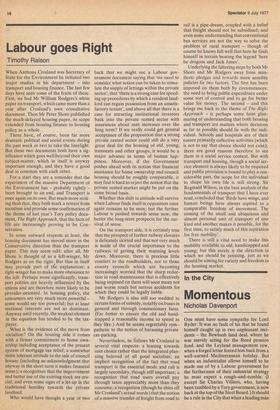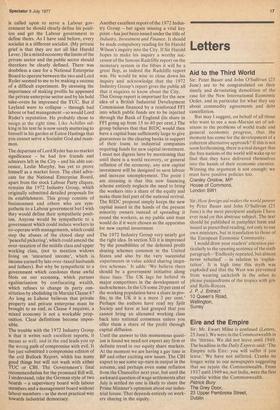In the City
Momentous
Nicholas Davenport
One must have some sympathy for Lord Ryder. It was no fault of his that he found himself caught up in two unpleasant incidents — the Bewbush land deal, where he was merely acting for the Reed pension fund, and the Leyland management row, when a forged letter forced him back from a well—earned Mediterranean holiday. But when an industrialist allows himself to be made use of by a Labour government for the furtherance of their industrial strategy he must expect a rough—and—tumble. (I except Sir Charles Villiers, who, having been tumbled by a Tory government, is now back at the top of the Steel Board.) It should be a rule in the City that when a leading man
is called upon to serve a Labour government he should clearly define his position and get the Labour government to define theirs. As I have said before, every socialist is a different socialist. (My private grief is that they are not all like Harold Lever.) In a mixed economy the limits of the private sector and the public sector should therefore be clearly defined. There was doubtless a case for a National Enterprise Board to operate between the two and Lord Ryder seemed to me to be making a success of a difficult experiment. By stressing the importance of making profits he appeased the private enterprise sector and by his bold take—overs he impressed the TUC. But if Leyland were to collapse — through bad labour or bad management —so would Lord Ryder's reputation. He probably chose to resign at the right time. Like Achilles sulking in his tent he is now surely muttering to himself in his garden at Eaton Hastings that you cannot serve a Socialist God and mammon.
The departure of Lord Ryder has no market significance — he had few friends and admirers left in the City — and his able suebessor, Leslie Murphy, has yet to prove himself as a market force. The chief advocate for the National Enterprise Board, apart from the stock Labour Party cliques, remains the 1972 Industry Group, which originally submitted detailed proposals for its establishment. This group consists of businessmen and others who are sympathetic to a Labour government but I wish they would define their sympathetic position. Anyone would be sympathetic to a government which could induce workers to co—operate with managements, which could stop the abuses of the closed shop and 'peaceful picketing', which could amend the over—taxation of the middle class and upper working class, (not to mention widows living on 'unearned income', which is income earned by late over—taxed husbands and fathers). But why be sympathetic to a government which condones these awful blots on our economy, which pursues egalitarianism by confiscating wealth, which refuses to change its party constitution by abolishing its Marxist Clause 4? As long as Labour believes that private property and private enterprise must be brought to an end, as Clause 4 requires, a mixed economy is not a workable proposition. Clear definitions become impossible.
The trouble with the 1972 Industry Group is that it writes such excellent reports, it means so well, and In the end leads you up the wrong path of compromise with evil. It has just submitted a compromise edition of the evil Bullock Report, which has many good things but will not wash with either TUC or CBI. The Government's final recommendation for the promised Bill will, I understand, take the German style of two boards — a supervisory board with labour members and a management board without labour members — as the most practical way towards industrial democracy.
Another excellent report of the 1972 Industry Group — but again missing a vital key point —has just been issued under the title of Industry, Investment and Finance, it should be made compulsory reading for Sir Harold Wilson's inquiry into the City. If Sir Harold hopes to make , his inquiry a worthy successor of the famous Radcliffe report on the monetary system in the fifties it will be a great flop, as indeed the Radcliffe report was. He would be wise to close down his inquiry and acknowledge that the 1972 Industry Group's report gives the public all that it requires to know about the City. This Group report is important for the new idea of a British Industrial Development Commission financed by a reinforced FFI into which public sfunds are to be injected through the Bank of England (its share in FFI going up from 15 to 40 per cent.) The group believes that that BID C would then have a capital base sufficiently large to give guarantees to the clearing banks in support of their loans to industrial companies requiring funds for new capital investment. I must not digress here by mentioning that until there is a world recovery, or general reflation of the economy, any new capital investment will be designed to save labour and increase unemployment. The point I am stressing is that this new financing scheme entirely neglects the need to bring the workers into a share of the equity and make them feel part of the national revival. The BIDC proposal simply keeps the new capital issued in the hands of the present minority owners instead of spreading it round the workers, as my public unit trust would do if it were chosen as the apparatus for new capital investment.
The 1972 Industry Group very nearly got the right idea. In section XII it is impressed 'by the possibilities of the deferred profit sharing schemes common in the United States and also by the very successful experiments in value added sharing incentive schemes.' It adds: 'We believe there should be a government initiative along these lines. The UK lags far behind its major competitors in the development of such schemes. In the US some 20 per cent of the working population have a share in profits; in the UK it is a mere 3 per cent.' Perhaps the authors have read my Split Society and have at last grasped that you cannot bring an alienated working class back into national consensus unless you offer them a share of the profit through capital diffusion.
Until the answer to this momentous question is found we need not expect any firm or definite trend in our equity share markets. At the moment we are having a gay time in BP and other exciting new issues. The CBI expect to see some up—turn in output in the autumn, and perhaps even some reflation from the Chancellor next year, but until the awkward question of wage settlements after July is settled no one is likely to share the Prime Minister's optimism about our industrial future. That depends entirely on work ers sharing in the equity. •



































 Previous page
Previous page